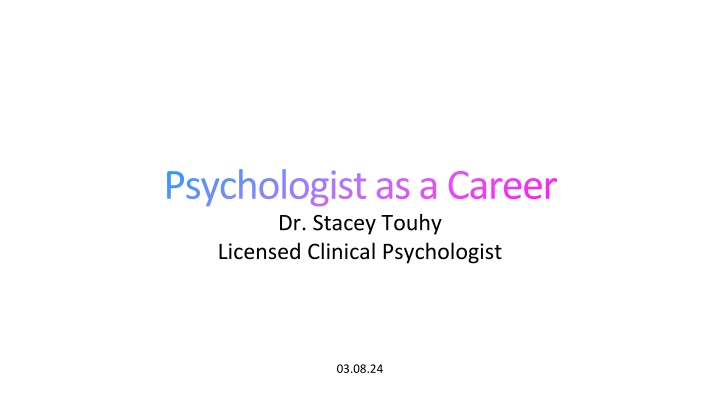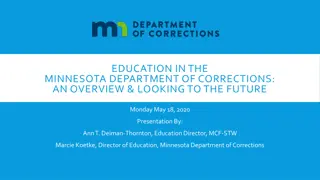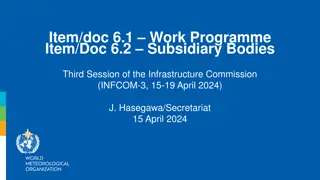
Insights into a Career as a Licensed Clinical Psychologist
Discover the journey of Dr. Stacey Touhy, a Licensed Clinical Psychologist, into her profession. Explore her daily routine, responsibilities, and the realities of working in private practice. Gain valuable insights for aspiring psychologists.
Download Presentation

Please find below an Image/Link to download the presentation.
The content on the website is provided AS IS for your information and personal use only. It may not be sold, licensed, or shared on other websites without obtaining consent from the author. If you encounter any issues during the download, it is possible that the publisher has removed the file from their server.
You are allowed to download the files provided on this website for personal or commercial use, subject to the condition that they are used lawfully. All files are the property of their respective owners.
The content on the website is provided AS IS for your information and personal use only. It may not be sold, licensed, or shared on other websites without obtaining consent from the author.
E N D
Presentation Transcript
Psychologist as a Career Dr. Stacey Touhy Licensed Clinical Psychologist 03.08.24
Schedule 40min Introduction Psychologist as a Career IRL Goal - My realistic view of profession as Clinical Psychologist Answer key questions Last 10 min. - Your questions, write them down and I will answer them as best I can
Introduction Highlights of my journey into career and how I got there Received AA from local community college while living at home and working. Took time to work to save money and then transferred to UCR as Junior Received BA in Psychology from UCR, 2005 Studied Abroad - Cognitive and Biological Psychology Program Applied to graduate school programs. 2007-2011 - Went to Argosy University in the SF Bay Area, received Psy.D. in Clinical Psychology, Masters along the way. Did yoga teacher training programs, got married, had a child, taught yoga part and full time, worked in different realms of part time psychology including volunteer positions Studied for licensure, passed licensure exams, became licensed in CA 2015.
Key Questions What does a typical day look like? Currently I am in private practice Telehealth video individual therapy with adults Therapy sessions one hour Notes, administrative work, billing, business tasks, insurance company tasks Answer emails, answer phone calls, answer inquiries
Key Questions What do you spend most of your time doing every day? The days are variable Most days I spend hours doing therapy and then administrative work and notes. Some days I see 1 patient, some days I see 6 patients, most Fridays I do not see patients and catch up on admin, notes, billing, responding to phone and emails. Some Thursdays and Fridays I have meetings scheduled, some patients scheduled, have my own therapy, personal appointments, consultations, teach CE courses, contract work, supervise interns etc.
Key Questions What are the day to day responsibilities that someone outside the field might not know about? It is NOT just about talking to people each hour and doing therapy. There is preparation before and work afterwards of each session to do. Do not talk what you do not know. Get out of your own way. It is hard to work to get out of your own way and be as fully present as possible for each individual session and person. It takes preparation and work and diligence to to what we need to do to show up and do the work as best as we can. That is something that sometimes is not taught well in school or without very good supervision. If you have a private practice, you run your own business, so it requires many business skills.
Key Questions What can you tell us about related occupations in your field? There are MANY pathways. Different schoolings Different degrees Different types of therapists Counselors, life coaches, consulting psych (I/O), independent contractors, school psychs (ED), PhD research psych, neuro psych, social work (LCSW), Marriage and Family Therapist (LMFT), PsyD, substance abuse counselors
Key Questions What levels of education and training are required? Mine required doctoral degree, took me 5 years. Began practicum hours when started grad school, 2 years of practicum. Began pre-doc internship hours, 1500 required. Got PsyD degree, than could begin acquiring post- doc hours 1500 required. Then qualify for taking licensure exams, national and state, passed those and then get licensed.
Key Questions Are there other related occupations that a person would be qualified for? Yes, since I have my doctorate in Clinical Psychology, I have a lot of autonomy to do many things within the field of Psychology, however there are nuances in each realm of Psychology that require different experience and have certain specific qualifications. LMFT, LCSW, LPCs, school psychologist all have certain educations and trainings that have differences. A few examples - working with certain populations, working within certain organizations like primary care settings, research experience, assessment and testing experience, group experience, couples experience, family therapy, APA accredited school and/or internships.
Key Questions What you are learning in school applies to my occupation It depends on where you go in your career in psychology which aspects of psychology classes will be relevant for you. The requirements for passing licensure exams and the requirements for getting licensed (registering and applying to be a psychologist) and maintaining your license (CEs) all require course work be completed and certain units be obtained. The actual work you do is most likely go to be directly or indirectly related to humans and human behaviors. My work now is real life application of what was taught in school. Research and discernment and dissemination of information is VERY important to stay up to date in the field of work, so the more you learn about how to find, read and utilize research and study research in the topics and field you are working in the better. It is also required in our CE requirements and ethical codes. I am constantly having to stay up to date on diagnosis, treatment and interventions because that is what my work is. That requires me reading a lot of information and thinking critically.
Human Growth and Development How I use it Each patient is at a different developmental stage of their life and that impacts their presenting issues in therapy. Think of it like concentric circles of influence with individual in center. Example senior in high school, pressure for college or no college, job ..what job? What am I supposed to do with my life? What does the messaging of my society and culture and family say, what access to resources or not do I have? How I am supposed to be on my own? What if I do not know what I want to do? Why is everyone pressuring me and asking me? What if the messaging from older generations does not apply to my generation? Example college student trying to get degree and get job and get a place to live on their own and maybe get into a serious relationship and decide do they want to start to have kids or no. Family rules and norms and patterns beginning to be questioned, developing independence and deciding what fits and what doesn t. It is complex with many layers that all need to be taken into consideration, they also change all the time, need to meet people where they are at.


